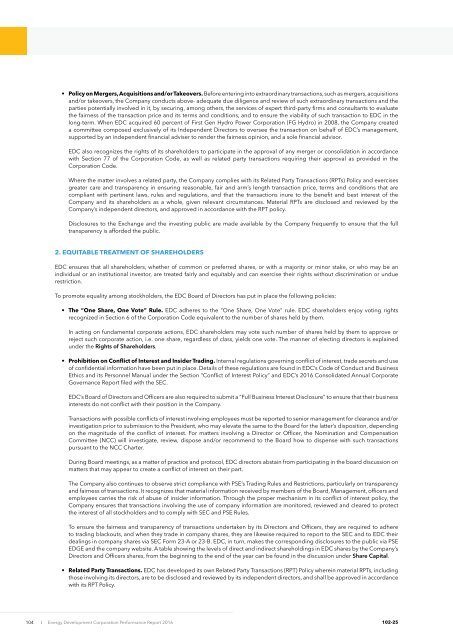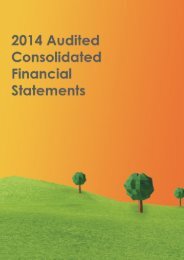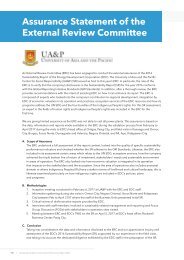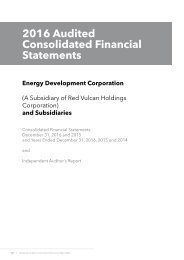EDC PR 2016 (CorpGov section)
Create successful ePaper yourself
Turn your PDF publications into a flip-book with our unique Google optimized e-Paper software.
• Policy on Mergers, Acquisitions and/or Takeovers. Before entering into extraordinary transactions, such as mergers, acquisitions<br />
and/or takeovers, the Company conducts above- adequate due diligence and review of such extraordinary transactions and the<br />
parties potentially involved in it, by securing, among others, the services of expert third-party firms and consultants to evaluate<br />
the fairness of the transaction price and its terms and conditions, and to ensure the viability of such transaction to <strong>EDC</strong> in the<br />
long-term. When <strong>EDC</strong> acquired 60 percent of First Gen Hydro Power Corporation (FG Hydro) in 2008, the Company created<br />
a committee composed exclusively of its Independent Directors to oversee the transaction on behalf of <strong>EDC</strong>’s management,<br />
supported by an independent financial adviser to render the fairness opinion, and a sole financial advisor.<br />
<strong>EDC</strong> also recognizes the rights of its shareholders to participate in the approval of any merger or consolidation in accordance<br />
with Section 77 of the Corporation Code, as well as related party transactions requiring their approval as provided in the<br />
Corporation Code.<br />
Where the matter involves a related party, the Company complies with its Related Party Transactions (RPTs) Policy and exercises<br />
greater care and transparency in ensuring reasonable, fair and arm’s length transaction price, terms and conditions that are<br />
compliant with pertinent laws, rules and regulations, and that the transactions inure to the benefit and best interest of the<br />
Company and its shareholders as a whole, given relevant circumstances. Material RPTs are disclosed and reviewed by the<br />
Company’s independent directors, and approved in accordance with the RPT policy.<br />
Disclosures to the Exchange and the investing public are made available by the Company frequently to ensure that the full<br />
transparency is afforded the public.<br />
2. EQUITABLE TREATMENT OF SHAREHOLDERS<br />
<strong>EDC</strong> ensures that all shareholders, whether of common or preferred shares, or with a majority or minor stake, or who may be an<br />
individual or an institutional investor, are treated fairly and equitably and can exercise their rights without discrimination or undue<br />
restriction.<br />
To promote equality among stockholders, the <strong>EDC</strong> Board of Directors has put in place the following policies:<br />
• The “One Share, One Vote” Rule. <strong>EDC</strong> adheres to the “One Share, One Vote” rule. <strong>EDC</strong> shareholders enjoy voting rights<br />
recognized in Section 6 of the Corporation Code equivalent to the number of shares held by them.<br />
In acting on fundamental corporate actions, <strong>EDC</strong> shareholders may vote such number of shares held by them to approve or<br />
reject such corporate action, i.e. one share, regardless of class, yields one vote. The manner of electing directors is explained<br />
under the Rights of Shareholders.<br />
• Prohibition on Conflict of Interest and Insider Trading. Internal regulations governing conflict of interest, trade secrets and use<br />
of confidential information have been put in place. Details of these regulations are found in <strong>EDC</strong>’s Code of Conduct and Business<br />
Ethics and its Personnel Manual under the Section “Conflict of Interest Policy” and <strong>EDC</strong>’s <strong>2016</strong> Consolidated Annual Corporate<br />
Governance Report filed with the SEC.<br />
<strong>EDC</strong>’s Board of Directors and Officers are also required to submit a “Full Business Interest Disclosure” to ensure that their business<br />
interests do not conflict with their position in the Company.<br />
Transactions with possible conflicts of interest involving employees must be reported to senior management for clearance and/or<br />
investigation prior to submission to the President, who may elevate the same to the Board for the latter’s disposition, depending<br />
on the magnitude of the conflict of interest. For matters involving a Director or Officer, the Nomination and Compensation<br />
Committee (NCC) will investigate, review, dispose and/or recommend to the Board how to dispense with such transactions<br />
pursuant to the NCC Charter.<br />
During Board meetings, as a matter of practice and protocol, <strong>EDC</strong> directors abstain from participating in the board discussion on<br />
matters that may appear to create a conflict of interest on their part.<br />
The Company also continues to observe strict compliance with PSE’s Trading Rules and Restrictions, particularly on transparency<br />
and fairness of transactions. It recognizes that material information received by members of the Board, Management, officers and<br />
employees carries the risk of abuse of insider information. Through the proper mechanism in its conflict of interest policy, the<br />
Company ensures that transactions involving the use of company information are monitored, reviewed and cleared to protect<br />
the interest of all stockholders and to comply with SEC and PSE Rules.<br />
To ensure the fairness and transparency of transactions undertaken by its Directors and Officers, they are required to adhere<br />
to trading blackouts, and when they trade in company shares, they are likewise required to report to the SEC and to <strong>EDC</strong> their<br />
dealings in company shares via SEC Form 23-A or 23-B. <strong>EDC</strong>, in turn, makes the corresponding disclosures to the public via PSE<br />
EDGE and the company website. A table showing the levels of direct and indirect shareholdings in <strong>EDC</strong> shares by the Company’s<br />
Directors and Officers shares, from the beginning to the end of the year can be found in the discussion under Share Capital.<br />
• Related Party Transactions. <strong>EDC</strong> has developed its own Related Party Transactions (RPT) Policy wherein material RPTs, including<br />
those involving its directors, are to be disclosed and reviewed by its independent directors, and shall be approved in accordance<br />
with its RPT Policy.<br />
104<br />
I Energy Development Corporation Performance Report <strong>2016</strong><br />
102-25
















